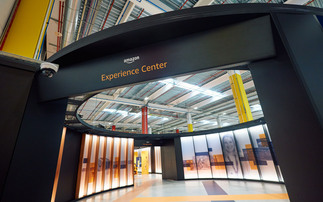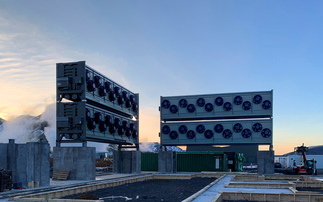Herve Mariage of Mitsubishi Heavy Industries Air Conditioning Europe explains how heat pumps are already delivering major financial and environmental savings - and there's a lot more to come
We take it for granted - turn on the tap and hot water comes out. But we pay a high price for this comfort and convenience, both financially and environmentally.
Heating water is a significant contributing factor to global warming. It is an energy-intensive process which accounted for 13 per cent of US residential energy consumption in 2010, despite the progress made by governments and regulators to reduce CO2 emissions across commercial, industrial, and domestic sectors.
Hot water is also a costly resource to come by, both for heavy users in industry and for commercial operators like hotel chains, hospitals, and developers of apartment blocks.
A major factor driving financial and environmental costs is the prevalence of conventional, low-efficiency water heating systems across the world. Despite changing regulations, gas boilers are still by far the most common source of domestic and commercial hot water, but they are fundamentally inefficient.
That means there is huge potential to reduce greenhouse gas emissions with a widespread transition to less carbon-intensive water heating technologies.
Air-to-water heat pump technology is one attractive option, offering sizeable energy savings and a greatly reduced carbon footprint.
Japan leads the way
Japan is one country where air source heat pumps (which extract heat from outside air) are already a popular choice for water heating - a clear endorsement of the technology's capability and practicality across a range of applications.
The Japanese government was ahead of the game in recognizing the need to transition away from gas water heating, towards more energy-efficient electrical heating solutions.
Japan fully committed to a future of greener heating in 1986 and has since been at the forefront of heat pump research and development, installing hundreds of thousands of new units every year.
Outside of Japan, heat pumps have been particularly popular in commercial settings, where they enable operators to minimize the impact of carbon taxes as well as affording them significant cost reductions compared to traditional heating systems.
A simple principle
The idea of a device that can extract heat from outside air, even when temperatures dip below freezing, may seem fanciful at first glance. In reality, heat pumps rely on a simple principle of physics and some clever engineering.
Ambient air from outside enters the heat pump and is compressed alongside a refrigerant. The refrigerant absorbs latent heat from the air, which is then released when the refrigerant is decompressed and used to heat an internal water source.
While the fundamental workings of a heat pump already generate efficiencies, the choice of refrigerant is another critical factor in reducing emissions.
Advanced air-to-water heat pumps use carbon dioxide as a refrigerant which has a global warming potential 1,700 times lower than another common refrigerant, R-410A.
Carbon dioxide also allows for more efficient heat transfer at low temperatures - so you can still get 90C hot water when it's a chilling -25C outside.
The increased efficiencies which result from this are significant in terms of both environmental and financial impact.
Mitsubishi Heavy Industries (MHI) has calculated that, for its Q-ton heat pump, this can amount to 45 per cent less carbon - with a global warming potential (GWP) of only 1 - and 40 per cent lower running costs, compared to a traditional gas-fired boiler. Compared to immersion heaters, the savings are even higher - for 1KW input, heat pumps can generate 3.5KW output, while immersion heaters generate just 1KW.
An opportunity for industry
The biggest impact heat pumps can make is arguably in the industrial and commercial sectors.
A 2010 Japanese study found that a reduction of 40 million tons of CO2 per year could be achieved if 11 of the world's developed economies substituted traditional boilers for heat pumps in their food and beverage industries alone - where substantial amounts of water are used in cleaning processes.
In a similar vein, the hotel and leisure industries have a thirst for readily available hot water. To prevent the growth and spread of waterborne diseases like legionella, water must be regularly heated above 65C and cycled throughout the system, a process which can be energy-intensive.
As of 2018, the global heat pump market is worth around $6.5bn dollars, and many countries have already implemented incentives and regulations to help promote heat pumps as a primary source of domestic and commercial hot water.
Financial incentives offered by Spain's Instituto Tecnológico Hotelero, a tourism innovation body, have driven a widespread switch towards heat pump technology within the Spanish hospitality sector.
In the UK, funding for renewable heating is available under the Renewable Heat Incentive, part of a wider UK government drive to hit 14 per cent renewable energy sources for heating by 2020.
Air source heat pumps have not reached the same level of popularity in the US market, although federal grants are available for geothermal heat pumps.
A changing landscape
If progress is to be made against unnecessary emissions, both domestic and commercial properties will need to switch to greener, more sustainable forms of water heating.
While water heating technologies are common, solutions which offer a bridge between efficiency and convenience are harder to come by.
It is the versatility and efficiency of air source heat pumps which makes them the ideal green solution to our ever-increasing need for hot water.
Incentives and promotion schemes look set to further solidify the presence of the technology in commercial settings. Following widespread adoption by hotels, office buildings and hospitals, the proven merits of heat pumps make them an obvious choice for homeowners going forward.
Herve Mariage is Product Manager at Mitsubishi Heavy Industries Air Conditioning Europe
To learn more about the latest trends, innovations, and leadership shaping industrial technology, visit Spectra.
Spectra is powered by Mitsubishi Heavy Industries Group.
© Mitsubishi Heavy Industries, Ltd.
For more information, please contact: [email protected]







